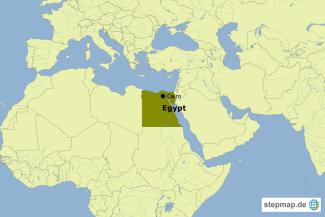Religious customs
Hijab debates on Facebook
 stepmap.de
stepmap.de
In the 1970s, young women did not bother to cover their arms, legs or hair. Two decades later, the same women now urge their daughters to wear a hijab, which has become a symbol of a good Muslim woman. In other words, hijab isn’t a personal choice anymore; it has become an Islamic dress code supported by the community. However, a new trend has arisen in Egypt’s urban areas, where the younger generation questions many popular social and religious beliefs, also regarding the religious necessity to wear a headscarf. They promote taking it off.
Many women share their experience about taking off the hijab with Facebook groups. Most of them belong to the urban upper and middle class. They often argue that they “want to show their beauty”. Even though their number is small compared with the millions of veiled women in Egypt, the headscarf supporters consider the new trend a threat to religious norms.
In August 2014, a young woman named Manal Rostom created a Facebook group for supporting women in their religious commitment to hijab, called “Surviving Hijab”. She admits that she is “finding it harder every day to keep wearing a headscarf”, especially when she sees “faithful girls taking it off.” Nonetheless, she believes in the religious norm.
Her online group has grown to more than 49,000 members. They support each other with postings about hijab fashion, enjoying their life while wearing the hijab, and their struggle for keeping it. “I wear hijab because of my love for God”, one member posted. “I love God more than my desire for people to think I’m beautiful. God loves modesty.”
However, the Facebook group welcomes “unveiled women” too. One member, who wears the veil, argues that taking off the hijab can be considered “a normal reaction after years of oppression”. She points out that “women want to decide themselves”.
The motivations for wearing the hijab vary. While some believe in obeying Allah’s order in covering their body, for many uneducated women it is a way of protecting themselves getting a “bad reputation” in their neighbourhood. Sociologists often argue that hijab isn’t religious obligation, but rather a traditional custom in Egypt.
Secular politician Bahaa Anwar says: “The headscarf is not obligatory in Islam and it is used by clerics to control women.
A piece of cloth cannot possibly determine how religious a woman is.” Psychology professor Rashad Abdel Latif links the phenomenon of taking off the hijab to the rise of atheism in Egypt, which is a response to the Muslim Brotherhood ruling the country for one year and imposing its strict approach to Islam.
Basma El-Mahdy is a print journalist specialising in human rights issues. She lives in Cairo, Egypt.
basmaelmahdy@gmail.com

